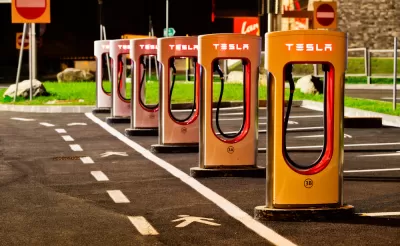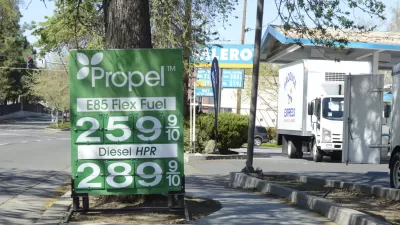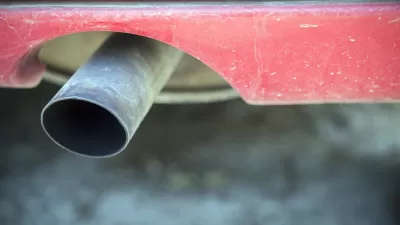A rollback of fuel economy standards carries huge financial consequences for the all-electric vehicle manufacturer that makes over $300 million annually by selling credits to auto manufacturers unable to achieve current fuel economy standards.

Spring hasn't been good for Tesla: A second fatal crash in Autopilot mode; the largest recall in its history; its bonds are in free fall; a credit-rating downgrade, and falling short of Model 3 production targets.
While the conventional auto industry was delighted with U.S. Environmental Protection Agency Administrator Scott Pruitt's announcement Monday that his agency, working with the National Highway Traffic Safety Administration (NHTSA), a division of the U.S. Department of Transportation, would initiate "rulemaking to set more appropriate greenhouse gas (GHG) emissions standards and corporate average fuel economy (CAFE) standards for cars and light trucks for model years 2022-2025," the news has the potential dire consequences for manufacturers of high fuel-economy vehicles.
"This was the right decision, and we support the Administration .... as it works to finalize future standards," states the April 2 news release from the Alliance of Automobile Manufacturers, the leading advocacy group for the auto industry.
Tesla, which sells only zero-emission vehicles, and not among the dozen auto manufacturers represented by the Alliance, saw Monday's rollback differently.
“Fuel economy standards should be strengthened, not weakened,” Tesla spokeswoman Gina Antonini told Vox's climate and energy reporter, Umair Irfan. “This is overwhelmingly the opinion of the scientific community.”
It's not just science – it's business
The current GHG emissions and CAFE standards, 54.5 mpg by 2025, which translates to "36-38 mpg in real-world terms," enable auto manufacturers which aren't able to achieve the targets to buy credits from those companies who have exceeded them. Tesla is in a class of its own due to its all-electric lineup, though their dominance has created an unexpected challenge for California to meet its aggressive zero-emissions vehicle targets.
"Tesla stands to lose hundreds of millions of dollars annually in three types of lucrative emissions and efficiency credit sales," explains Irfan, if EPA gets its way, which will likely be determined in court due to threatened litigation by California and possibly other states.
According to Tesla’s latest 10-K filing with the Securities and Exchange Commission, the company has seen more and more money coming in from selling these credits. “Revenue from the sale of regulatory credits totaled $360.3 million, $302.3 million and $168.7 million for the years ended December 31, 2017, 2016 and 2015, respectively,” according to the filing.
“They can leverage the same car in multiple categories,” said Benjamin Leard, a research fellow at Resources for the Future.
Weakened fuel efficiency rules "would let companies like Chrysler and GM, which scrape the bottom of average fuel economy rankings, [to] breathe easier," explains Irfan.
That means the weaker regulations will simultaneously help the dirtiest, hurt the cleanest, and derail years of tenuous progress in reducing environmental harm from a growing source of pollution.
The rollback fallout goes beyond Tesla as it will impact the entire electric vehicle industry. Conventional automakers are likely to reduce their investments in clean vehicles if the Trump administration succeeds in reducing emission standards.
Hat tip to Dino Grandoni of The Washington Post.
FULL STORY: The EPA is rolling back fuel efficiency standards

Alabama: Trump Terminates Settlements for Black Communities Harmed By Raw Sewage
Trump deemed the landmark civil rights agreement “illegal DEI and environmental justice policy.”

Study: Maui’s Plan to Convert Vacation Rentals to Long-Term Housing Could Cause Nearly $1 Billion Economic Loss
The plan would reduce visitor accommodation by 25% resulting in 1,900 jobs lost.

Planetizen Federal Action Tracker
A weekly monitor of how Trump’s orders and actions are impacting planners and planning in America.

Waymo Gets Permission to Map SF’s Market Street
If allowed to operate on the traffic-restricted street, Waymo’s autonomous taxis would have a leg up over ride-hailing competitors — and counter the city’s efforts to grow bike and pedestrian on the thoroughfare.

Parklet Symposium Highlights the Success of Shared Spaces
Parklets got a boost during the Covid-19 pandemic, when the concept was translated to outdoor dining programs that offered restaurants a lifeline during the shutdown.

Federal Homelessness Agency Places Entire Staff on Leave
The U.S. Interagency Council on Homelessness is the only federal agency dedicated to preventing and ending homelessness.
Urban Design for Planners 1: Software Tools
This six-course series explores essential urban design concepts using open source software and equips planners with the tools they need to participate fully in the urban design process.
Planning for Universal Design
Learn the tools for implementing Universal Design in planning regulations.
Caltrans
Smith Gee Studio
Institute for Housing and Urban Development Studies (IHS)
City of Grandview
Harvard GSD Executive Education
Toledo-Lucas County Plan Commissions
Salt Lake City
NYU Wagner Graduate School of Public Service





























